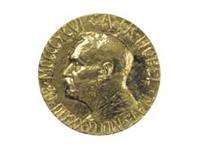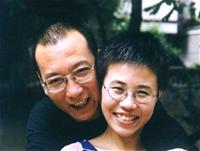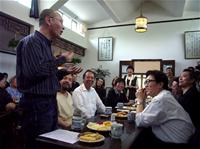Serbia seeks balance between East and West
Evelyna Topalova, December 10, 2010
 Serbia faced this week a very tricky choice and found itself in the position to seek balance between its foreign policy priorities after succumbing pressure from China and deciding not to send a representative at the Nobel Peace Prize awarding ceremony. This years' laureate is Chinese dissident Liu Xiaobo who has been honoured for his long and non-violent struggle for fundamental human rights in China. Liu Xiaobo has been serving a 11-year sentence in China on subversion charges after co-authoring a manifesto from 2008 calling for protection of human rights and political reforms.
Serbia faced this week a very tricky choice and found itself in the position to seek balance between its foreign policy priorities after succumbing pressure from China and deciding not to send a representative at the Nobel Peace Prize awarding ceremony. This years' laureate is Chinese dissident Liu Xiaobo who has been honoured for his long and non-violent struggle for fundamental human rights in China. Liu Xiaobo has been serving a 11-year sentence in China on subversion charges after co-authoring a manifesto from 2008 calling for protection of human rights and political reforms.
Beijing has condemned the nomination and has tried to thwart the ceremony. Chinese authorities even announced they would launch their own peace prize - Confucius peace prize - that would incarnate their own view of contribution to peace. China tried to do its best to dissuade number of countries to send their representatives at the ceremony on December 10th in Oslo.
Serbia was among these 19 countries along with Russia, Afghanistan, Iraq, Cuba and Venezuela voicing support for China's position. Serbian authorities said that Serbia pays attention to human rights but also to its relations with China. "Serbia gives an extremely high importance to bilateral relations with China. All our decisions are related to fulfilling national interests and China is one of Serbia's most important bilateral partners," Foreign Minister Vuk Jeremic said.
Belgrade has announced recently that the four pillars of its foreign policy are the  European Union, Russia, the US and China. However, it might be hard to maintain the balance among the country's strategic partners.
European Union, Russia, the US and China. However, it might be hard to maintain the balance among the country's strategic partners.
Serbia's decision to shun the Nobel Peace Prize ceremony sparked a lot of criticism both abroad and at home. European Parliament Rapporteur for Serbia Jelko Kacin voiced his amazement by the decision and in an interview with the Deutsche Welle he even slammed the country's "servility". Eduard Kukan, chairman of the EP Delegation for relations with Southeast European countries, also assessed Serbia's boycott as bad news. He recalled that respect of human rights is a priority for the EU and a country's attendance at the ceremony could be interpreted as a sign that it is truly committed to respecting the struggle for human rights worldwide.
The European Commission echoed their concern and recalled that the bloc has come to a common position to respect the ceremony. At home, Serbia’s government's decision sparked critical reactions by several non-governmental organisations and opposition political parties that called on the cabinet to review their position.
In the end, Belgrade decided on the eve of the ceremony to send its ombudsman Sasa Jankovic as a representative of the prime minister. Thus the government ended the discussions on whether the initial stance was well-grounded or not and explained that the decision to send Jankovic is in response to the broad expectations among politicians and society.
What actually made Serbia align itself with China over the Nobel Peace Prize ceremony?
Belgrade tried to demonstrate that it was supporting one of its major international allies over the Kosovo issue. We should bear in mind that China is a permanent member of the UN Security Council with veto power and the Kosovo independence issue has been raised repeatedly during debates in the UN. China is also one of the most important trade partners of Serbia, which counts on major Chinese investments, particularly in the infrastructure and energy sector.
Serbia is well aware that as long as it can count on support from China and Russia, Kosovo will not be admitted for membership in the UN and its access to other international bodies would be blocked. Belgrade authorities have repeatedly said that they should not be put in position to choose in exchange for Kosovo.
The price for it could be European integration. The EU has never formally linked Serbia's accession with Kosovo's recognition. Not all member states however share the same opinion, if it is to believe the diplomatic cables, released by the whistle-blower site WikiLeaks and quoted by Serbian media. According to leaks, senior representatives of the French Foreign Ministry had insisted before their US and EU counterparts to make it clear to Serbia that it should recognise Kosovo if it wants to join the EU.
 Serbia has softened its position when submitting in September a resolution on Kosovo that clears the way for EU-mediated dialogue with Pristina. Talks will have to wait until a new government in Pristina is formed following the December 12th snap elections. Topics that are to be discussed and participants are yet to be announced. Kosovo claims it will hold talks only on issues related to people's daily life while Belgrade is implying that the status issue could also be a subject of the talks.
Serbia has softened its position when submitting in September a resolution on Kosovo that clears the way for EU-mediated dialogue with Pristina. Talks will have to wait until a new government in Pristina is formed following the December 12th snap elections. Topics that are to be discussed and participants are yet to be announced. Kosovo claims it will hold talks only on issues related to people's daily life while Belgrade is implying that the status issue could also be a subject of the talks.
Is Belgrade going to balance between its foreign policy priorities without neglecting some of its strategic partners? Let me conclude with an editorial by the Danas daily on the subject.
"We are facing a dilemma - credits or human rights, sovereign policy or policy aligned with the EU, Kosovo or the EU? This comes to show us that we will have to choose between different things more often and in the end we will have to choose one of the pillars than others if we want stability. And let's be realistic - the European Union has no alternative," the daily says.
 Bakir Izetbegovic, Andrej Plenkovic | © Council of the EU
Bakir Izetbegovic, Andrej Plenkovic | © Council of the EU Aleksandar Vucic, Recep Tayyip Erdogan | © Serbian Presidency
Aleksandar Vucic, Recep Tayyip Erdogan | © Serbian Presidency Jean-Claude Juncker, Zoran Zaev | © European Commission
Jean-Claude Juncker, Zoran Zaev | © European Commission